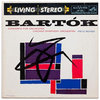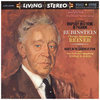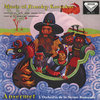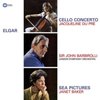AAA 100% Analogue This LP was Remastered using Pure Analogue Components Only from the Master Tapes through to the Cutting Head
Speakers Corner / Philips - 835 249 AY - 180 Gram Virgin Vinyl - AAA 100% Analogue
Limited Edition - Pure Analogue Audiophile Mastering - Pressed at Pallas Germany
Speakers Corner 25 Years Pure Analogue This LP is an Entirely Analogue Production
The original pressings are not easy to find, although there were three different re-issues and box-sets of the symphonies (alone, or coupled with Antal Dorati’s versions of the Orchestral Suites) where the sound decreased in quality with each issue. So, if one wants the best sound, it has to be this Speakers Corner disc. - Classical Source
An extraordinary performance and great sound to boot. Highly recommended.5/5 LPreview
Pyotr Ilyich Tchaikovsky: Symphony No. 4 - The London Symphony Orchestra conducted by Igor Markevitch
Does it make sense to revive an early stereo recording of one of the most recorded works and put it on the market again? Certainly a valid question when one considers the enormous number of recordings of Tchaikovsky’s Symphony No. 4. But when one listens to the Russian maestro’s mature work, it become quite clear why there is such a flood of recordings – although one often has the feeling that they are taking part in a musical Olympics, trying to go faster or louder, rather than achieving musical depth.
With his unfailing, meticulous analysis of the score, Markevitch demonstrates just how much substance lies between the fateful, morbid fanfares on the brass at the beginning, the phantasmal arabesques of the pizzicato third movement, and the explosive, intoxicating finale: a dancelike verve that is reminiscent of his opera "Eugene Onegin" which was composed at the same time, the rising up and ebbing away of the passionate melodies, and the close-knit interplay of the voices allow us to share in the elation and enthusiasm Tchaikovsky felt during the work’s composition. But why this particular recording? Because Markevitch shows that the key to a thrilling Tchaikovsky recording lies neither in sheer force nor superficial exaltation and a swift tempo, but in resoluteness, great perceptiveness for the melodies, and a passion for detail.
Igor Markevitch recorded all of Tchaikovsky symphonies (including Manfred) for Philips between 1962 and 1966. The Fourth dates from October 1963, and what a performance it is! In the first movement the opening fate motif is not too slow, and the group of themes that follow are very clearly differentiated, with numerous variations of tempo (most of which are unmarked) and a plasticity of phrasing that avoids self-indulgence. Markevitch also gets the LSO to play with immense weight, subtlety, feeling – the woodwind sound positively Russian – and conviction. Tchaikovsky marks the second movement Andantino in modo di canzone, it stays in 2/4 time all the way through, and the only marked tempo change is that for the move to the major in the central Più mosso section. Unusually, Markevitch largely follows the score, only making slight adjustments to the speed to emphasise expressive points. There is a lightness of touch in the pizzicato scherzo that is exhilarating, without being breathless. Markevitch takes note of the meno mosso marking for the trio and introduces a wonderfully playful, unexpected, sudden ritartando to the bass before the upper-string pizzicatos resume. There is tremendous propulsion at the start of the finale: one will rarely hear the individual strands of the second subject so clearly delineated and delivered with such lilt, and when the theme reappears it is weighed down with melancholy. The rhythmic spring at the start of the coda is exceptional, rolling forward to a doom-laden final chord. Vladimir Ashkenazy, Evgeny Mravinsky (various), Gennadi Rozhdestvensky (live with the Leningrad Philharmonic at the Proms) and Evgeny Svetlanov have all made great recordings of the Fourth, and this Markevitch version is another classic.
The Tchaikovsky is very much like the original Dutch Hi-Stereo pressing, although the Speakers Corner LP has slightly greater definition, and the brass rasps and snarls more. Unlike the Liszt there is depth, a realistic balance between the sections of the orchestra, and the strings have tangible body, all of which makes the CD transfers sound sadly inadequate.
Tchaikovsky
Symphony No. 4 In F Minor, Op. 36
A Andante Sostenuto- Moderato Con Anima
B1 Andantino In Modo Di Canzona
B2 Scherzo (Allegro)
B3 Finale (Allegro Con Fuoco)
London Symphony Orchestra
Igor Markevitch
Recorded 19-21 October 1963 at Wembley Town Hall, London
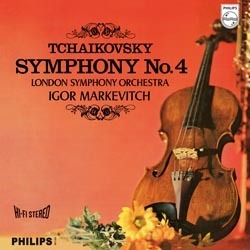
AAA 100% Analogue This Speakers Corner LP was remastered using pure analogue components only, from the master tapes through to the cutting head 25 Years pure Analogue
MADE FROM THE ORIGINAL MASTER TAPES
AAA 100% ANALOGUE - PURE ANALOGUE AUDIOPHILE MASTERING
We use the Original Tapes and work with only the Best Mastering Studios Worldwide
180 GRAM VIRGIN VINYL PLATED & PRESSED AT PALLAS GERMANY
Faithful Reproduction of the Original Artwork and Labels
LIMITED EDITION Released in Limited Quantities
All Licences and Mechanical Rights Paid
Are your records completely analogue?
Yes! This we guarantee!
As a matter of principle, only analogue masters are used, and the necessary cutting delay is also analogue. All our cutting engineers use only Neumann cutting consoles, and these too are analogue. The only exception is where a recording has been made – either partly or entirely – using digital technology, but we do not have such items in our catalogue at the present time
Are your records cut from the original masters?
In our re-releases it is our aim to faithfully reproduce the original intentions of the musicians and recording engineers which, however, could not be realised at the time due to technical limitations. Faithfulness to the original is our top priority, not the interpretation of the original: there is no such thing as a “Speakers Corner Sound”. Naturally, the best results are obtained when the original master is used. Therefore we always try to locate these and use them for cutting. Should this not be possible, – because the original tape is defective or has disappeared, for example – we do accept a first-generation copy. But this remains an absolute exception for us.
Who cuts the records?
In order to obtain the most faithful reproduction of the original, we have the lacquers cut on the spot, by engineers who, on the whole, have been dealing with such tapes for many years. Some are even cut by the very same engineer who cut the original lacquers of the first release. Over the years the following engineers have been and still are working for us: Tony Hawkins, Willem Makkee, Kevin Gray, Maarten de Boer, Scott Hull, and Ray Staff, to name but a few.
At the beginning of the ‘90s, in the early days of audiophile vinyl re-releases, the reissue policy was fairly straightforward. Companies such as DCC Compact Classics, Mobile Fidelity, Classic Records and others, including of course Speakers Corner, all maintained a mutual, unwritten code of ethics: we would manufacture records sourced only from analogue tapes.
Vinyl’s newfound popularity has led many other companies to jump on the bandwagon in the hope of securing a corner of the market. Very often they are not so ethical and use every imaginable source from which to master: CDs, LPs, digital files and even MP3s.
Even some who do use an analogue tape source employ a digital delay line, a misguided ’80s and ‘90s digital technology that replaces the analogue preview head originally used to “tell” the cutter head in advance what was about to happen musically, so it could adjust the groove “pitch” (the distance between the grooves) to make room for wide dynamic swings and large low frequency excursions. Over time analogue preview heads became more rare and thus expensive.
So while the low bit rate (less resolution than a 16 bit CD) digital delay line is less expensive and easier to use than an analogue “preview head”, its use, ironically, results in lacquers cut from the low bit rate digital signal instead of from the analogue source!
Speakers Corner wishes to make clear that it produces lacquers using only original master tapes and an entirely analogue cutting system. New metal stampers used to press records are produced from that lacquer. The only exceptions are when existing metal parts are superior to new ones that might be cut, which includes our release of “Elvis is Back”, which was cut by Stan Ricker or several titles from our Philips Classics series, where were cut in the 1990s using original master tapes by Willem Makkee at the Emil Berliner Studios. In those cases we used only the original “mother” to produce new stampers.
In addition, we admit to having one digital recording in our catalogue: Alan Parsons’ “Eye in the Sky”, which was recorded digitally but mixed to analogue tape that we used to cut lacquers.
In closing, we want to insure our loyal customers that, with but a few exceptions as noted, our releases are “AAA”— analogue tape, an all analogue cutting system, and newly cut lacquers.
60 Years Pallas
Audiophile Vinyl - Made in Germany For over 60 years the family business in the third generation of the special personal service and quality "Made by Pallas" is known worldwide. Our custom PVC formulation produces consistently high pressing quality with the lowest surface noise in the industry. Our PVC complies with 2015 European environmental standards and does not contain toxic materials such as Lead, Cadmium or Toluene. Our vinyl is both audiophile and eco-grade!




